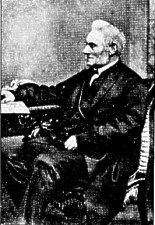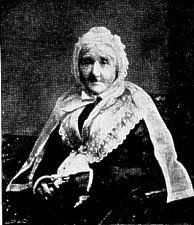 |
 |
|
Rev Wm Gill
|
Ann Gill
|
[From Thomas Howard Gill, 1895]
THOMAS HOWARD GILL.
A NOBLE WOMAN.
" Charity seeketh not her own."
NOT even its isolated position, nor the fresh sea breezes sweeping over its gorse-covered hills, could save the little Island of Man from the terrible scourge of cholera, and when it ravaged other lands it cast its blight also on the tiny sea-girt isle.
In a poor cottage in one of the small island towns, a woman lay dying of the fell disease. She was utterly alone in her agony, save for the infant at her breast.
Neighbours dreaded to enter, an old fisherman had promised to let the doctor know; but he had work enough on his hands, so was not likely to trouble about a poor, lone woman! All night she lingered, struggling against death, for the sake of the child, which surely, too, would die with none to nourish it! At early dawn, life was ebbing fast, her eyes were dim and her voice was gone, yet still she hushed the babe ! Suddenly the cottage door opened and a woman stood on the threshold. A strong, brave woman bringing with her a ray of early sunlight, which fell upon the fast dying woman and her child; surely she was one of God's angels come to carry them in her strong arms up to heaven ! A smile broke over the dying face, and the weak arms relaxed their hold of the child, who, wailing, turned from the dying mother to the living woman, and held out her little arms, mouthing with its dry, thirsty lips, a piteous pleading !
She entered fearlessly, and stooping, gathered it in her arms, hushed it, as only a mother can, and nursed it at her bosom, where, one short hour before, her own son had lain.
The dying woman saw and understood, and so passed away, carrying the beatific vision with her, up to the throne of God. Marcia Gell covered the dead face, straightened the poor limbs, and taking the child once more in her arms carried it to her home and kept it, until its natural relations, no longer in terror of catching "the death," came for it. She who did this deed of charity was a Manx woman, the wife of Henry Gell, and the daughter of the Rev. Henry Corlett, Vicar of Peel and Chaplain at Bishop's Court to the good Bishop Wilson, whom all men called " The Saint of the Isle of Man." Doubtless Marcia Corlett had often sat at "the saint's" feet, and felt his hand upon her head in kindly blessing; thus learning her lesson of faith, hope, and charity, which in her turn she taught her own little ones, and so on from generation to generation.
The Rev. William Gill was this noble woman's son, born on the 30th of July, 1797.
The Isle of Man had known dark days of sin and sorrow under the rule of the Manx " Athols."
" Never," we read, " was the condition of the island so abject as in their day. Never were the poor, poorer. Never was the name of ' Manxman' so deservedly a badge of disgrace."
Alas ! that we should have to say that the clergy were little better than the laity. Only a few kept their lamps burning, hoping and praying for better times; and they did not pray in vain. In due time, the ancient discipline of the Church was restored, and there was found in her midst some of the purest, truest men that ever walked God's earth. Such a man was the Rev. Hugh Stowell: first, curate of Douglas, afterwards rector of Ballaugh, called; "The Apostle of the Church of Sodor and Man."
The memory of this holy man still lingers round the spot which he sanctified by his life. One who as a child knew him well, has thus written of him: "Mr. Stowell was as perfectly saintly as was possible for human beings to attain to perfect sanctity. . . . The children never shrank from that old man-from that venerable saint. It was quite as natural for a little child to go up and put its hand in that of Mr. Stowell's, as for it to amuse itself. They sang to him, and the sweet old voice sang to them and prayed with them. They used to sit on the old trunk in his bed-room, and he would hear their hymns and he would end with prayer. It might be thought that this sort of thing would alarm a child, but they, as children, never felt alarmed at or shrank from him ; they liked his voice; they liked the touch of his hand; they liked to feel his breath on their cheeks; they liked the whole man."
 |
 |
|
Rev Wm Gill
|
Ann Gill
|
It was in this home that William Gill, son of the brave Marcia, wooed and won his wife, Ann Stowell, the rector's eldest daughter. She was already remarkable for her strong religious faith, her sweetness, and the influence she exercised over her younger brothers and sisters. So intimately is her life entwined with her children's, that her name will appear again and again in these pages, a holy Christian mother, who trained her sons and daughters in the fear of the Lord, even as the faith that dwelt in Timothy had first dwelt in Eunice.
Doubtless, it was with feelings of sorrowful regret that the father saw this well-beloved daughter go forth from the shelter of his love and care.
Passionately fond of his island home, her customs, and her history, at his request his bishop, who thought much of him, gave a special license, that his eldest daughter's marriage might be celebrated at night by torchlight, when the parishioners could all be present. The effect must have been very strange and weird! Let us picture the scene — the old church, with its white-washed walls and low Norman windows, lit up by the flickering, flaming torches. The vicar standing in his white surplice on the chancel steps, and before him the young bride and bridegroom kneeling, full of love and reverence, awaiting the blessing. From the surrounding villages the young men and maidens had flocked in, crowding together in the porch, hushing their laughter and merriment out of respect for the parson; but ready to burst forth in good wishes when, hand in hand, the new made husband and wife should pass through their midst, with the torch-bearers before and behind, lighting them on their way.
Nine years after, in 1829, the Crown presented William Gill with the vicarage of Malew, being the first appointment by the Crown after the purchase of the Church patronage from the Duke of Athol. Thither the family removed, and took up their residence in the vicarage of Malew, which was to be their home for forty-one years.
In the year 1836 a great sorrow fell on the family, indeed, on the whole island ! Hugh Stowell departed to be with God. His children and his children's children surrounded him in those last moments, and sitting at his bedside was the friend of his heart, Thomas Howard, whom he besought, if possible, to take charge of his parish, and when he consented to do so, it seemed to make the cup of his joy overflow. No one was forgotten; he prayed for his family and his flock, remembering even the unborn child, and bestowing on it an especial blessing. A few minutes later he waved his hand, and exclaimed: " More than conqueror! more than conqueror ! " then, after a pause, he added: " A world of glory breaks upon my view; I see angels and arch-angels, cherubims and seraphims," and almost immediately after, he expired without a struggle. " So He giveth His beloved sleep."
Strange, indeed, that fifty-seven years later, the unborn child he had blessed should bear his testimony in almost the self-same words, " Glory, glory," as he, too, fell asleep.
And that child was Thomas Howard Gill, the fifth and youngest son of William Gill and Ann his wife, born on the 28th of June, 1836; and his grandfather's friend, Thomas Howard, one of the most holy and lovable of men, called by his brother clergy, " our St. John," stood sponsor for the boy.
|
|
||
|
|
||
|
|
||
|
Any comments, errors or omissions gratefully received
The Editor |
||